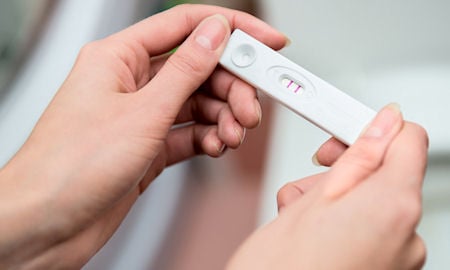
Evalutation before IVF
Before starting ART, each patient is evaluated to help maximize her chances for success and a healthy pregnancy. Good preconception health is essential to achieving pregnancy with IVF. Chronic medical conditions such as diabetes, hypertension and asthma should be well controlled before attempting to conceive. In addition, women planning an IVF cycle should optimize their weight. Obesity has been associated with infertility, a reduced chance of success with IVF, and an increase in the risk of miscarriage and preterm birth. Your physician can help you determine your ideal weight and refer you to appropriate resources for weight management.
Blood Tests
General
Prior to starting IVF, providers may verify a patient's blood type and documentation of immunity to rubella (German measles) and varicella (chicken pox). Vaccination can be offered before pregnancy if immunity is not present. The patient and her partner will also be tested for sexually transmitted infections including hepatitis B and C, HIV, and syphilis. Genetic carrier screening evaluates for hereditary conditions that may affect her child’s health. This testing offers the additional advantage of identifying couples at risk of having children with genetic diseases. The patient can then be offered appropriate testing to optimize patient education, counseling, and options for achieving pregnancy. Patients at risk of having children with specific genetic diseases can be counseled about the disease's inheritance and course and offered referral for potential interventions, such as preimplantation genetic testing.
Ovarian Reserve Testing
As women age, they have a decreased ability to conceive and an increased risk of miscarriage. The reproductive potential of the ovaries, termed ovarian reserve, represents the number of remaining eggs in the ovaries and may be assessed by serum tests or ultrasonography. Decreased ovarian reserve predicts a lower response to ovarian stimulation medications in ART. The results of ovarian reserve tests should be considered in the context of the patient’s age, as the quality of the eggs is related to age. Ovarian reserve tests are good predictors of response to ovarian stimulation, but poor results do not necessarily predict the inability to achieve a live birth.
- Anti-Mullerian Hormone Test (AMH): AMH levels remain relatively stable throughout the menstrual cycle and can be assessed on any day of the menstrual cycle. An AMH value less than 1.0 can predict a low response to stimulation.
- Day 2-5 Levels of FSH, and Estradiol: Follicle-stimulating hormone values greater than 10 IU/L are associated with a less robust response to ovarian stimulation. Estradiol serves as an aid for interpreting FSH results. Basal estradiol levels typically should be less than 60–80 pg/mL; elevated estradiol levels may have a suppressive effect on FSH levels and may be indicative of decreased ovarian reserve.
- Ultrasonographic assessment of the antral follicle count: determines the number of follicles that measure 2–10 mm in both ovaries at the start of the menstural cycle. Low antral follicle count may be defined as fewer than 5–7 follicles and is associated with poor response to ovarian stimulation. However, antral follicle count is a relatively poor predictor of future ability to become pregnant.
Semen
A semen analysis should be reviewed. Semen parameters can help determine whether standard insemination of eggs or intracytoplasmic sperm injection (ICSI) may be advised.
Uterus
The uterus is usually evaluated prior to an IVF to determine if there are any abnormalities present that would negatively impact implantation. Three methods can be used: a hysterosalpingogram, a saline infusion sonohysterography, or a hysteroscopy.
Prior to IVF, a trial or “mock” transfer may be done. The purpose of this procedure is to determine the length and direction of the uterus. This enables the physician to anticipate any difficulties with the embryo transfer.
For more information, see these fact sheets:
LINKS: ASRM FACT SHEETS
- Weight and Fertility
- Smoking and Infertility
- Ovarian Reserve (Predicting Fertility Potential in Women)
- Diagnostic Testing for Infertility
- Male Fertility Evaluation: What do I need to know?
- Hysterosalpingogram (HSG)
- Evaluation of the Uterus
- Saline Infusion Sonohysterography

